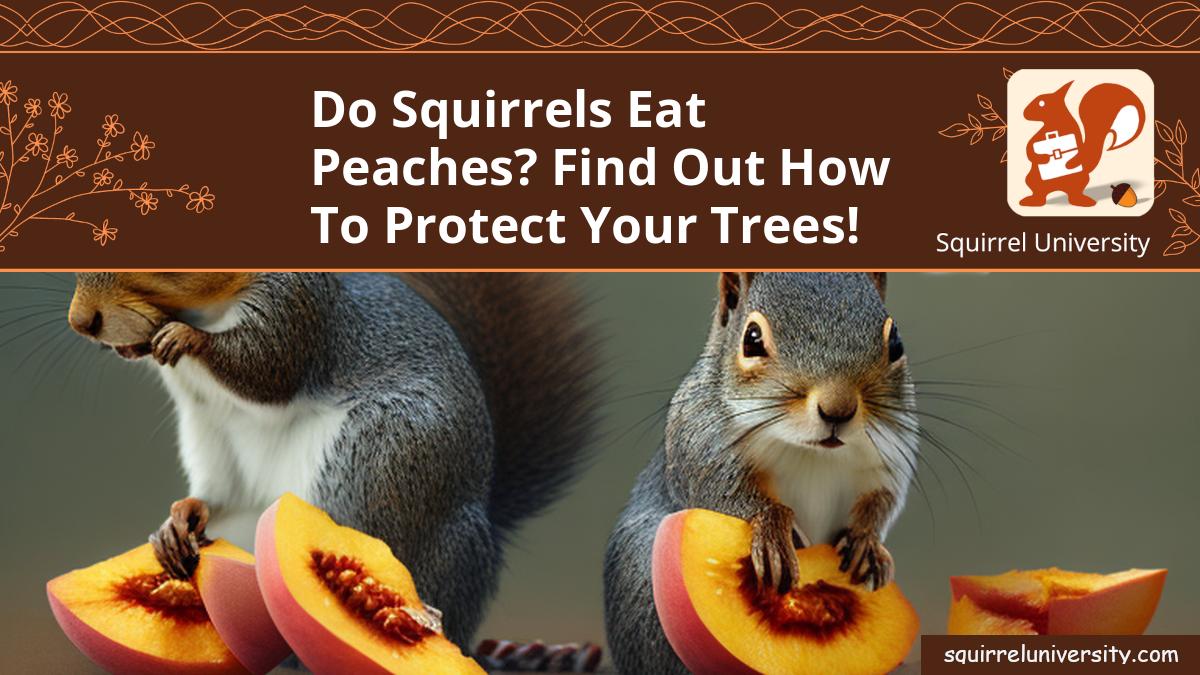As a nature lover and someone with several years of experience observing and interacting with squirrels all around the world, I can confidently tell you that yes, squirrels do eat peaches! But how can you protect your trees from these furry pests? In this blog post, I will provide you with valuable insight on how to keep your peach trees safe from hungry squirrels. So stay tuned to find out more about the eating habits of squirrels and what measures you can take to protect your precious fruit-bearing trees!
Squirrels mostly eat nuts, seeds, fruits and fungi. Among fruits, they enjoy some varieties of berries, apples and pears. Though peaches are not a common part of their diet, they occasionally sample them.
Do Squirrels Eat Peaches?
Yes! Squirrels do eat peaches when they come across them in nature; however, it is not typically included in their regular consumption patterns as much as other fruits like apples or pears. As stone fruits (or drupes), peaches often require more effort to open up their fleshy exterior to access the sweet pulp inside – thus making them seem less attractive than other easier-accessed fruits like berries.
How to Protect Your Fruit Trees from Squirrels?
If you have fruit trees with delicious peaches and other fruits, you may be wondering how to protect them from pesky squirrels. Fortunately, there are several steps you can take to keep your trees safe. Firstly, use bird or netting cages around the tree which will stop pet squirrels from reaching the peaches. Secondly, provide alternate food sources such as nuts or seeds away from the tree so that they’re distracted from it. Finally, regularly prune branches to reduce hiding places for these furry intruders.
Create a Physical Barrier
Creating a physical barrier is one of the most effective and long-term solutions for protecting fruit trees from squirrels. A fence made from wood or metal can be constructed around the tree to keep squirrels out. It’s important that the bottom of the fence extends several inches below ground level, so that rodents are unable to burrow underneath.
Wire mesh or hardware cloth can also be used as an additional layer of protection against squirrels. This material should extend at least two feet high, with enough slack in it to prevent animals from being able to climb up over it.
Fencing Around The Tree
A fence made from either wood or metal can effectively block out intruding squirrels, providing your fruit trees with ample protection throughout each season. To ensure maximum security, make sure that the bottom edge of your added fencing stretches down beneath soil level — as this prevents any potential rodent burrowing from occurring underneath.
Wire Mesh or Hardware Cloth
To further strengthen your efforts in preventing unwanted visits from unwelcome guests, consider adding an extra layer of wire mesh or hardware cloth atop your existing fencing. This material should stretch up at least two feet (depending on how tall your tree is) and include some slack, making it difficult for any pests to scale it without much effort.
Lastly, you could also consider investing in either plastic or metal tree guards and collars for further defense against pesky critters such as squirrels. These wrap snugly around the trunk of your fruit tree and serve as yet another barrier which makes raiding far more challenging than usual!
Tree Guards and Collars
Tree guards and collars are an effective way to protect your trees from pesky squirrels. Tree guards, also known as tree wraps, are made of plastic or metal and fit snugly around the trunk of a tree to create a physical barrier that keeps squirrels away. Tree collars are another form of protection that prevents rodents from climbing onto and damaging young trees, as well as protecting them from mechanical damage. Both types of protection should be installed correctly for best results; if done properly they can help keep your trees safe and healthy!
Use Repellents
If you are looking for a way to keep your fruit trees safe from pesky squirrels, one of the best options is to use repellents. Repellents can come in a variety of forms, from natural odors like garlic and peppermint oil to more commercial products like motion-activated sprinklers and ultrasonic devices.
Motion-Activated Sprinklers
Motion-activated sprinklers are a great tool for deterring squirrels away from your fruit trees. These systems work by detecting any movement near the tree, such as that created by a squirrel invading your garden or yard. When motion is detected, the system will spray water at the trespassing animal in order to frighten it off before it can do any damage.
Odor Repellents
Another type of repellent commonly used to keep squirrels away from fruit trees is an odor repellent. This can be made using natural ingredients such as garlic cloves or peppermint oil, which produce strong aromas that have been found to repel rodents. Additionally, there are numerous commercially available odor repellents on the market that you may want to consider using if you don’t want to make your own.
Here’s one of the best squirrel repellents:
Add Decoy Food Sources
If you have problems with local wildlife raiding your fruit trees, one solution is to provide decoy food sources away from them–this way they won’t venture too close when they realize they already have easy access elsewhere.
You can easily create these alluring alternatives with bird seed mixes, nuts or suet cakes placed around areas further out in your garden or just outside its boundaries.. This strategy should divert their attention far enough away so they won’t bother with getting closer than necessary and dig into your precious crops.
- Bird Seed Mixes: A mix of sunflower seeds and peanuts makes an enticing snack for birds and small mammals alike.
- Nuts: Providing delicious pieces of walnuts or almonds likely won’t stop determined pest creatures but may curb their enthusiasm somewhat if done correctly.. Place them in outer locations where there’s still reachable distance between them and chewing distance from fragile plants!
Try Electronic Devices
For more serious infestations certain electronic devices might prove useful at keeping those curious fur balls at bay… Such items include touch sensitive alarms triggered by heat detection as well as ultrasonic sound emitters that send out high frequency sound waves meant only for hearing levels detectible by animals like squirrels…. Despite being considered humane solutions these methods aren’t infallible since regular exposure will cause animals’ innate instincts eventually render most attempts practically useless.. Therefore multiple units must be used simultaneously along with other preventative measures for maximum effectisty.
Ultrasonic Devices and Lights
Ultrasonic devices and lights are both effective tools for protecting your trees from unwanted visitors. Ultrasonic devices emit high-frequency sound waves that can scare away squirrels and other animals, while motion-activated lights can startle them with a bright flash of light when they enter an area. These solutions are easy to install and provide long-lasting protection for your trees.
Types of Squirrels in the US
Squirrels are among the most common small animals across North America; they can be seen scurrying around almost any backyard or park. Not all squirrels are alike, though. Depending on where you are in the United States, there are up to three different types of squirrels that may be sharing your home with you.
Common Squirrel Types
In the US, there are many types of squirrels that can be found. These include grey squirrels, fox squirrels, red squirrels and more. Each species has different preferences in terms of what they like to eat. Grey squirrels tend to prefer nuts, seeds and berries while red squirrels prefer fruit like peaches and other soft fleshy fruits.
Understanding the type of food your local squirrel population may enjoy can help you protect your trees by making sure there are no easy access points for these furry creatures to snack on!
Gray Squirrels
Gray squirrels are common visitors to yards, gardens and woodlots – they are the most widespread tree squirrel in North America. They eat a variety of foods including nuts, fruits, seeds and other plant material. To protect your trees, it is best to keep them away by trimming branches and installing physical barriers such as fences or netting around the trees. Additionally, providing bird feeders that offer sunflower seeds can also divert their attention away from fruit trees!
Red Squirrels
Red squirrels love to eat peaches, especially during ripening season. To protect your trees from these hungry critters, make sure to pick up fallen fruits as soon as possible and don’t forget to cover tree branches with netting or mesh. Make sure any gaps are filled in so the red squirrels can’t get in!
Flying Squirrels
Flying squirrels, unlike their ground-dwelling counterparts, are capable of taking to the air—gliding from one tree or branch to the next in search of food. They’re nocturnal and eat a variety of nuts, fruits, and fungi. To protect your trees from these furry visitors, make sure to place bird feeders away from the tree trunks and prune low-hanging branches that could act as pathways for them. Additionally, wrapping thin wire mesh around trunks may help prevent climbing access.
Conclusion
The answer to the age-old question, do squirrels eat peaches? is yes. While they may not enjoy eating a peach as much as corn or acorns, they will certainly snack on them when they can. To protect your trees from squirrels, you should regularly prune them, keep an eye out for pests and predators, make sure the soil around the tree has adequate drainage and nutrients, and use a squirrel repellent if necessary.
By taking these steps to protect your trees from pesky squirrels and other unwelcome visitors, you can rest assured that your peach trees will remain healthy for years to come! So next time you’re wondering ‘Do Squirrels Eat Peaches?’ – have no fear – but do take proactive measures in order to keep your precious fruit-bearing friends safe!
You may also be interested in reading:









